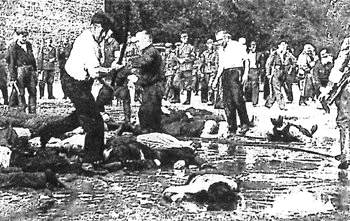The Editor of this
website appears to belong to the "I hate Poles" brigade
(having been involved in Polish-Jewish dialogue for 20
years, I have heard many people say that quite
explicitly. Other statements of the same sort are "The
Poles were worse than the Germans" and "The camps were
built in Poland because Hitler could count on the Poles
to cooperate".)
In general, the
Jewish street, lacking historical knowledge, has a
grossly exaggerated impression of the degree to which
Poles collaborated with the Nazis and the role they
played in the Holocaust. The usual argument is "97% of
the Jews died in Poland, more than in any other country.
Antisemitism was rampant in Poland. The connection is
obvious."
The facts are
true, but the connection is not, as my book [Secret
City: The Hidden Jews of Warsaw, 1940-1945; Yale
University Press (2003)] shows.
There is not a
single historian who has studied Poland during the
Holocaust professionally who would make such statements.
Deborah Lipstadt, for one, has a blog in which she tries
to combat these misconceptions and stereotypes. The late
Lucy Dawidowicz also worked into her book, The War on the
Jews, an explicit refutation of the "camps were in
Poland" argument. Many others have tried, but the myth
persists. Hence Polonsky's comment on the gulf between
the professionals and the amateurs.
Like Lipstadt, I
believe that professional historians have a social
responsibility to debunk myths and correct
misimpressions, and that is why I have engaged in
dialogue with you. However, at the end of the dialogue
comes your attempt to publish an off-the-cuff response of
mine as if it were a scholarly article, prefaced by the
gratuitous editorial comment:
|
"Dr.
Paulsson thesis and premise that "the Jews of
Poland where under no particular threat prior
to their ghettoization" is preposterous
beyond words reaching perhaps the level of
the Absurd."
|
By the way, by "no
particular threat" I mean of course that their lives were
not yet threatened. [Why
"of course"?]
Many Jews felt threatened, and 300,000 of them fled to
the East (for which they neither needed any help from the
Poles, nor asked for it). But there was as yet no
concrete threat that the Poles could be expected to
respond to. Also, Jews and Poles had lived apart for 800
years by mutual consent, and each had their own self-help
organizations.
Let me now dissect
the headline of your posting:
|
"It is
preposterous beyond words to think, even for
a second, that this infinitesimal percentage
of the Righteous Christian Poles can ever
wash out the monstrous deeds of the
overwhelming great majority of Poles that at
best remained indifferent and at worst
committed atrocities beyond any human
dimension."

|
|
Murdering
of Jews in Kovno by
Lithuanian nationalists
under the eyes of the SS in
June 1941. When the SS
mobile killing units
reached Kovno in the first
few days of the war against
the Soviet Union, they
persuaded the
anti-communist partisan
leader Klimatis to turn his
forces against the Jews, to
demonstrate that "the
liberated population had
resorted to the most severe
measures against
the ... Jewish enemy."
|
|
|
SS
Photo -
<friends-partners.org/partners/beyond-the-pale/eng_captions/55-1.html>
|
|
"Monstrous deeds
of the overwhelming great majority of Poles". Hm. I would
tag perhaps 20,000 Poles with "monstrous deeds", or
around 0.1% of the population.
The "infinitesimal
percentage" of the Righteous in Poland currently stands
at over 6,000, and I estimate on the basis of evidence
from all over Europe, as well as my own work with memoirs
by Polish Jews, that the number of "Righteous" currently
recognized represents about 2% of those who deserve the
honour. (I published an article on this in the Journal of
Holocaust Education some years ago, when I estimated the
proportion at 1%, but the number has grown since then).
For example, as I think I've mentioned, there are all of
22 "Righteous" Danes, and fewer than 50 from Le
Chambon-sur-Lignon, where the entire population of 5,000
was involved in helping Jews. There are only 200 from the
Nieuwlande area in the Netherlands, where an entire group
of villages co-operated in rescuing Jews. Of the cases in
my files on Warsaw that seem to deserve the honour, only
10% appear on the list kindly provided to me by Yad
Vashem, and that means 10% of the cases that are already
documented in archives and memoirs. Since only 3% of
Warsaw survivors documented their experiences, the number
of undocumented cases must be much larger.
If we go at it by
estimating how many Jews were in hiding and how many
Poles it took to hide one Jew, we arrive at a number in
the range of 200,00-300,000, which would mean that the
6,000 represent roughly 2-3% of the total, consistent
with the percentages I have given. Since there are now
22,000-odd officially recognized "Righteous" in all, that
would suggest that over a million Europeans risked their
lives to rescue Jews, which agrees with the estimate
given many years ago by Pear and Sam Oliner in their book
"The Altruistic Personality". There are so many things
you don't know.
The first time I
ran into the "infinitesimal percentage" argument, the
number of Polish "Righteous" was under 1,000, and people
thought that was all there were.
Conclusion:
the "infinitesimal percentage" of Righteous Poles is
about 10-15 times as large as the number of
perpetrators.
Now how do you get
from 0.1% to "the overwhelming great majority"? By
conflating "indifference", which is unfortunately a
universal human characteristic (elsewhere on your site,
you state that the European population in general was
indifferent), with the very small number of people who
actually committed atrocities. You thereby creating the
impression that pretty much the majority of Poles were
monsters.
As I point out in
my book [ibidem], if that were anywhere
close to being true, it would have been impossible for
anyone to survive in hiding.
So this is tabloid
journalism --going after sensationalism rather than
accuracy.
I notice in your
entire section on Poland ***
that you start off with Polish antisemitism, go on to
Jedwabne, Radzilow and Kielce, and only two- thirds of
the way through do you get around to the Nazis.
Apparently Jedwabne was an "atrocity beyond any human
dimension", but Auschwitz was a summer camp
*.


